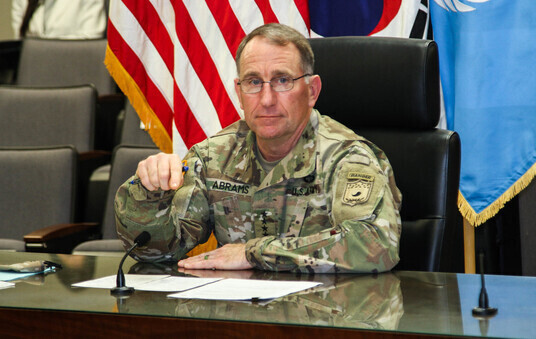hankyoreh
Links to other country sites 다른 나라 사이트 링크
Whom do former USFK commanders speak for?

Gen. Robert Abrams, former commander of US Forces Korea (USFK), said in an interview with Voice of America on Saturday that the South Korean military doesn’t have the military capabilities needed to assume wartime operational control (OPCON) of allied forces. Abrams also said that the Chinese response needs to be incorporated into the allied operational plan that Korea and the US agreed to update at the beginning of this month.
Referring to the end-of-war declaration that has been advocated by South Korean President Moon Jae-in, Abrams said, “I’m very unclear what it is we’re trying to accomplish.” Korea’s conservative newspapers devoted considerable coverage to Abrams’ remarks.
One wonders why Abrams, who served as commander of USFK, ROK-US Combined Forces Command (CFC), and UN Command from November 2018 until July 2021, would have made such remarks.
If Abrams was speaking from a sincere desire to keep the peace on the Korean Peninsula, given the thorough knowledge of the security situation in Korea and the US gained during his time as CFC commander, we ought to pay heed to his words. But if he was speaking as a former USFK commander who remains under the control of the US Joint Chiefs of Staff, we should take his remarks with a grain of salt.
It’s the duty of the USFK commander to see things from the US’ perspective and defend American interests. And Abrams’ remarks strongly reflect American interests and the perspective of a former USFK commander.
If South Korea and the US were to add the Chinese response to their new operational plan, the plan would have to specifically address positioning CFC troops to prepare for the Chinese threat and to carry out drills aimed at destroying strategic targets in the Chinese military.
That would signify Korea’s willingness for its 500,000 soldiers to be mobilized on the front line in the US’ attempted encirclement of China and to even fight against Chinese troops in the event of war. Would the Korean public readily accept such a situation?
That’s why Boo Seung-chan, spokesperson for Korea’s Ministry of National Defense, expressed annoyance in his daily press briefing on Monday. Abrams’ argument about adding a Chinese response to the operational plan was “merely his personal opinion,” Boo said, while adding that “we can’t know the intention” behind the remarks.
The American government’s position about the timing of the OPCON transfer has varied with the circumstances.
“In 2006, the Bush administration called for moving forward the OPCON transfer to 2009 on the grounds that the Korean military had sufficient capabilities,” recalled Kim Jung-sup, deputy director of the Sejong Institute. But President Roo Moo-hyun delayed the timeframe to April 17, 2012, sensing that the public was anxious about the security ramifications.
Since 2007, Korea has cumulatively invested more than 160 trillion won — or roughly US$134 billion — in upgrading its military capabilities to make the OPCON transfer possible.
But now the American government is arguing that it’s too soon to proceed with an OPCON transfer in a bid to contain China. Plus, several former US army commanders have been critical of the OPCON transfer. This seems linked to the fact that the US army would lose a position for a four-star general if a Korean were put in command of the CFC following the OPCON transfer.
The OPCON transfer should be seen not as a question of capability, but a matter of choice. Abrams’ remarks speak for the interests of the US government and American stakeholders. That’s why we should parse them critically, rather than put too much stock in them.
By Kwon Hyuk-chul, staff reporter
Please direct questions or comments to [english@hani.co.kr]

Editorial・opinion
![[Column] Life on our Trisolaris [Column] Life on our Trisolaris](https://flexible.img.hani.co.kr/flexible/normal/500/300/imgdb/original/2024/0505/4817148682278544.jpg) [Column] Life on our Trisolaris
[Column] Life on our Trisolaris![[Editorial] Penalties for airing allegations against Korea’s first lady endanger free press [Editorial] Penalties for airing allegations against Korea’s first lady endanger free press](https://flexible.img.hani.co.kr/flexible/normal/500/300/imgdb/original/2024/0502/1817146398095106.jpg) [Editorial] Penalties for airing allegations against Korea’s first lady endanger free press
[Editorial] Penalties for airing allegations against Korea’s first lady endanger free press- [Editorial] Yoon must halt procurement of SM-3 interceptor missiles
- [Guest essay] Maybe Korea’s rapid population decline is an opportunity, not a crisis
- [Column] Can Yoon steer diplomacy with Russia, China back on track?
- [Column] Season 2 of special prosecutor probe may be coming to Korea soon
- [Column] Park Geun-hye déjà vu in Yoon Suk-yeol
- [Editorial] New weight of N. Korea’s nuclear threats makes dialogue all the more urgent
- [Guest essay] The real reason Korea’s new right wants to dub Rhee a founding father
- [Column] ‘Choson’: Is it time we start referring to N. Korea in its own terms?
Most viewed articles
- 160% of young Koreans see no need to have kids after marriage
- 2New sex-ed guidelines forbid teaching about homosexuality
- 3Presidential office warns of veto in response to opposition passing special counsel probe act
- 4Months and months of overdue wages are pushing migrant workers in Korea into debt
- 5[Guest essay] Maybe Korea’s rapid population decline is an opportunity, not a crisis
- 6OECD upgrades Korea’s growth forecast from 2.2% to 2.6%
- 7[Column] Life on our Trisolaris
- 8Bills for Itaewon crush inquiry, special counsel probe into Marine’s death pass National Assembly
- 9Full text of press communique released at new round of six-nation
- 10Gangnam murderer says he killed “because women have always ignored me”